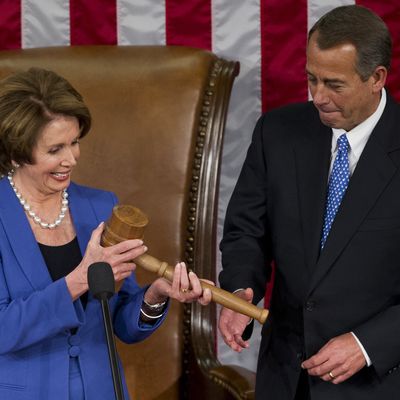
Shutting down the federal government is not, by a far sight, the most dangerous, cruel, or ideologically blinkered thing the House Republicans have done. But it is surely the most baffling. They have taken an issue, broad disapproval of Obamacare, where they enjoy a modest but persistent advantage and turned it into an issue — shut down the government over Obamacare — where they stand at an overwhelming, three-to-one disadvantage. They stepped on the message of what’s sure to be Obamacare’s glitchiest day. They’ve followed a course of action their leaders know full well stands no chance of success yet carries massive downside risks. For an act of comparable cost-benefit political stupidity, you have to look to politicians who screw interns or hookers, and even that has a biologically explicable motivation.
The wanton, tragicomic stupidity of the shutdown does have an explanation, to be sure. It’s an expression of the structural perversity of the House of Representatives. The bizarre makeup of the House has forced the government into a state of paralyzed dysfunction, teetering on outright catastrophe, for the last year. The glimmer of hope — far from likely but now conceivable — is that the drama of the shutdown has pushed into the open what had been obscured, making it finally possible to imagine the contours of a solution.
The illogic of the House rests on two overlapping facts. The first is that, because Republican votes are distributed more efficiently (and benefit from gerrymandering), Republicans won control of the House despite garnering some 1.4 million fewer votes. Republicans could keep the House even without controlling a single district won by Barack Obama.
The second fact is what political scientists call a “legislative cartel” — the party controlling the majority can freeze out bills that would attract the support of all members of the legislature if most of the majority party opposes them, making the chamber run on the internal logic of the majority party only. The more passionate, better-funded, better-organized right wing of the GOP has brought the leadership to heel. An aide to Senator Mike Lee boasted how the right-wing rump based in the Senate has called the shots in the House: “The minority of the minority” of the Senate GOP, he says, referring to the ascendant Tea Party Caucus, “is going to run things until our leadership gets some backbone.”
What makes this system so devilishly immune to democratic accountability is that the transfer of power is invisible to the naked eye. The members of the majority party hand their power to the leadership, which in turn hands power to their most extreme members. The only remotely vulnerable Republicans are the least radical Republicans, who occupy the most vulnerable districts,. Say you live in Pennsylvania and your representative is Charlie Dent. Representative Dent is fighting hard against the leadership to prevent a shutdown. If you’re following him in the news, you can read the hometown newspaper’s report explaining Charlie Dent’s opposition to his party’s tactics. But Charlie Dent is the one who is giving power to the very right-wing fanatics he is decrying, by supplying the decisive votes to the Republican majority. If you want to stop Ted Cruz from paralyzing the government, you need to vote against Charlie Dent. That is confusing.

There are two possible events that could conceivably change this. The first is an extended shutdown, which is a high-profile, dramatic encapsulation of Republican irresponsibility. The second is a debt-ceiling crisis. While more publicly obscure, the consequences of a debt-ceiling breach are potentially catastrophic. The debt ceiling is the event that has the potential — faint but real — to awaken the business community. Business has complacently assumed that Republicans are posturing in their demands. The government shutdown may underscore the reality that they are truly cut off from reality, that the gun they are aiming at the head of the world economy has live bullets.
So far, there is no sign of any such awakening. The U.S. Chamber of Commerce is calling for the government to be open and the debt ceiling to be lifted without conditions — which is to say it is backing the Democratic position. But it’s not organizing any kind of concerted attack on Republican rule of the House. The closest thing to an organization designed to bring pressure to bear on Washington to adopt centrist solutions is “Fix the Debt,” which is still issuing mushy, both-sides-must-work-together formulations that forfeit any chance of pressuring the party that actually stands in the way of its preferred outcome.
And the barrier here, aside from the eternal attraction of bipartisanship, is that the business community does not want to hand control of the House back to Nancy Pelosi. All-Democratic governance was at least as disastrous for the business lobby as Republican crisis governance is today: Democrats passed higher taxes on the rich, a health-care law, and financial regulations staunchly opposed by the U.S. Chamber of Commerce.
But what if the business lobby decides to engineer a House coup? The plan would require the following steps, each of which is unlikely, but none of which is impossible. First, a shutdown-induced plunge in popularity would have to endanger the reelection of a couple dozen of the most vulnerable Republicans. (A poll today has Democrats winning the generic ballot by nine points — hinting at the prospect of a real threat.)
Next, the vulnerable Republicans would have to be persuaded to bolt their party. The barrier there is huge. Business would have to front huge money to support these members, who would need to be persuaded that running as independents offers them a safer career path than staying under the Republican banner. Surviving primary challenges would surely be impossible — they’d need to rebrand themselves as independents, backed by big outside money. (Michael Bloomberg?) Reportedly, 25 House Republicans expressed sufficient private dismay with the shutdown strategy to float joining an open revolt against their leadership, though nearly all of them backed out. Seventeen of them would need to flip.

And the end point of the revolt would be not handing power to Nancy Pelosi but a more pragmatic Republican — a Tom Cole, a Peter King, a Devin Nunes. The bloc of defecting moderates would not govern the way Democrats would govern. But they would end the era of crisis. Government shutdowns and debt defaults would not be threatened. There is actually a fairly wide-ranging agenda that commands the support of Obama and a majority of both chambers of Congress, but that has been blocked by the Republican legislative cartel: a long-term budget compromise, lifting sequestration, patching up infrastructure, and immigration reform. Luckily, that agenda also appeals to the business types who would be needed to instigate this coup. The political carrot that could be dangled before the defectors actually involves a fair amount of progress, not merely the avoidance of disaster.
This sounds unlikely, and it is. But it’s not impossible. These sorts of coups have happened in the state of Washington and in Texas. It is, sadly, easier to imagine this happening after the disaster of a debt-ceiling breach than before, even though it would be far saner to forestall a catastrophe than to react to one. But it’s increasingly clear that House Republican rule is an unmitigated and unsalvageable calamity for the United States, and resolving that calamity is where the energies of sane people must be directed.






























